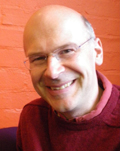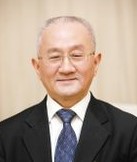Keynotes
Professor Peter Childs
Head of School, Dyson School of Design Engineering, Imperial College London, UK

|
Biography: Professor Peter Childs is Head of the Dyson School of Design Engineering at Imperial College London. His professional interests include: creativity tools and innovation; design; heat transfer and rotating flow; the circular economy and sustainable energy. Former roles include director of the Rolls-Royce University Technology Centre for Aero-Thermal Systems, director of InQbate and professor at Sussex University. He has contributed to over 180 papers, and several books on engineering design, rotating flow and temperature. He has been principal or co-investigator on contracts totalling £30 million. He is Director and Chief Scientific Officer at QBot Ltd.
|
Title: Robot Applied Floor Insulation
Abstract: Effective thermal performance of buildings is important in the worldwide effort to manage energy consumption. Significant opportunities exist to improve the performance of our existing and new building stock through innovations in thermal insulation. This presentation will describe a novel robotic system that surveys underfloor cavities and then applies thermal insulation and undertakes a detailed post application survey for quality assurance. Data from a case study of the analysis of under-floor thermal insulation installation in over 100 homes is analysed and presented, showing a reduction in heat loss of 78%, a reduction of draughts of 30% and that the intervention was the most cost-effective retro-fit option per EPC (Energy Performance Certificate) point.
Assoc. Prof. Dr. Ilona Sárvári Horváth
Associate Professor at The Swedish Centre for Resource Recovery, University of Borås, Sweden
|
|
Biography:
Ilona Sárvári Horváth holds a position as Associate Professor within the field of bioprocess engineering at the University of Borås, Sweden, and is one of the senior researchers within the research group called the Swedish Centre for Resource Recovery.
The field of Resource Recovery is one of the six strategic research areas at the University of Borås. Dr Sárvári Horváth has many years of experience in pre-treatment and utilization of biomass in both biogas and bioethanol production processes. During the years at the university, she has been responsible for several research projects aiming to survey waste materials including industrial and forestry wastes, as well as agricultural residues in close collaboration with several industrial and academic partners both through international and national cooperation. The main goal of her research is to design effective technologies for utilizing the organic fraction of wastes for renewable material, bio-energy and bio-fuel production. The University of Borås has a well-developed process for working towards sustainable development in higher education. Since the past few years, Ilona has been working with sustainable development issues as an active member of the University's strategy group working within this area. She has also got a mission to coordinate the research activities within the Faculty of Textiles, Engineering and Economics, and is a member of the Chancellor’s group working with strategic research issues at the University. Her research has so far resulted in about 50 peer-reviewed scientific publications one patent and seven technical reports, as well as several book chapters and conference presentations in the field of waste management and renewable energy production. |
Title: Towards zero waste – challenges and solutions for sustainable development
Abstract: The production of biofuels is of outmost importance to attain the environmental goals that our society has set regarding to sustainable development. The city of Borås has a dream on becoming a city free from fossil fuels in the near future. The University of Borås together with the city council and businesses connected to this area working together in close collaboration to achieve this dream.
All human activities result in waste and on the other hand, the wastes, generated from industry, agriculture, forestry and as well from households, has become a global problem that demands both knowledge and consideration to solve. Sweden has a well-developed expertise in waste management and environmental engineering. By the initiative of the University of Borås a knowledge triangle, called Waste Recovery was formed, working internationally with a carefully prepared partnership concept. The goal is to develop long-term sustainable overall solutions for waste management, starting from education of local competence, through mapping and planning, to constructing, opening up and operating facilities that have been adjusted to the local needs.
Prof. Dr. Yusheng XUE
State Grid EPRI / NARI, China

|
Biography:
Professor Yusheng Xue graduated from Shandong University, China in 1963, received an MSEE degree in 1981 in Electrical Engineering from EPRI, China and a PhD degree in 1987 from the University of Liege, Belgium. He has been an elected academician of the Chinese Academy of Engineering since 1995. He is now the Honorary President of State Grid Electric Power Research Institute (SGEPRI or NARI), China, Adjunct Professor in dozens of universities in China and a conjoint professor of the University of Newcastle in Australia. He is the Editor-in-Chief of Automation of Electric Power System (in Chinese, EI indexed) and that of Journal of Modern Power Systems and Clean Energy (in English, SCI IF 1.532), as well as Chairman of the Technical Committee of Chinese National Committee of CIGRE from 2005 to 2012.
Professor Xue received a National Prize on Science in 1977, a National First Prize of Achievement in the Advance of Science and Technology in 1996, National Second Prizes respectively in 2003, 2004, 2005, and 2012. He also received a First Prize of National Excellent Technical Book Prize in 2001, a National Prize of Golden Patent in 2006 and an Excellence Patent in 2012. By the end of 2017, 25 Master students, 40 Ph.D students and 4 post-doctor were successfully supervised in the field of power systems or nonlinear dynamics. Other 16 Ph.D students and 1 post-doctor are being supervised. He has published 8 books and more than 604 technical papers, including 120 SCI-indexed ones and other 310 EI-indexed ones. |
Title: From Smart Grid to Cyber-Physical-Social System in Energy
Abstract: TSmart Grids (SGs) as cyber-physical systems (CPS) in nature are electric networks that use innovative and intelligent monitoring, control, communication, and self-healing technologies to deliver better connections and operations for generators and distributors, flexible choices for prosumers, and reliability and security of electricity supply. However, in line with the global movement towards a sustainable renewable energy future to address Climate Change, SGs cannot fully reflect the requirements of dominating renewable energy generation, stringent economic and environmental constraints, market competition, social and regulatory requirements. On one hand, electric energy plays a central role in the whole energy supply chain since changing the energy from electric form to non-electric one may not be as effective as using electricity directly. On the other hand, any changes in primary energy and end-use energy significantly affect electric power reliability as well as economy. A more holistic (system-of-system) approach needs to be taken to deal with future energy systems, and a new concept of CPSS in energy (Cyber-Physical-Social System in Energy) is proposed. Consideration should be given to coordination of environmental, economic, social factors and human behaviors, a hybrid research framework across various disciplines concerned with different time and space scales. This enables collaborative mining big data with hidden causal relationships in the complex cross social, technological, economical, and environmental dimensions. The driving force induced by interaction between them may be much more powerful than the internal driving force of information systems, energy systems, and human societies themselves.
